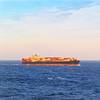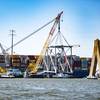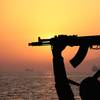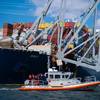Kara-Summer 2014 Arctic Field Expedition Started
The research and development expedition to investigate ice and metocean conditions in the Russian arctic organized by The Arctic Research and Design Center (the Rosneft and ExxonMobil JV) with the support of Arctic and Antarctic Research Institute experts has started in the White sea.
Scientific research vessel Akademik Tryoshnikov departed the Arkhangelsk port to move along the route from the Kara Sea to the Chukchee Sea, virtually along the whole of the Russian Arctic coast. The comprehensive research expedition will last for 57 days. It will involve experts of Roshydromet, All-Russian Research Institute of Geology and Mineral Resources of the World Ocean named after academician Igor Gramberg and Institute of Geography of the Russsian Academy of Sciences. During the expedition, scientists will explore the territory of several Rosneft license blocks in the Laptev Sea, the Kara Sea, the East Siberian Sea, and the Chukchee Sea.
Comprehensive investigations involve meteorological, hydrological, glaciological, volcanological and geochemical works. It is expected to launch three modern meteorological observing stations, and 16 buoy-based stations. Experts will study currents, water mass distributions, and explore variability of temperature.
There will be installed ofsensors on icebergs to constantly monitor their coordinates and drift. Scientists expect to explore glaciers at the archipelagoes of Novaya Zemlya and Severnaya Zemlya, as well as glaciers and volcanoes on the De Long Islands. There will be carried out advance geochemical survey for detection of shows of oil and gas in the Laptev Sea and the Chukchee Sea. Equipment and technologies of the expedition comply with the highest international standard.
Special attention will be paid to biological studies, including monitoring of marine mammals and birds. There will be studies of polar bears. Zoologist experts expect to obtain data on distribution of polar bears in the areas of interest, put collars with satellite sensors on adult polar bears, and then monitor their migration. It is also expected to subsequently carry out biological studies to estimate influence of environmental changes on polar bears.
All the works will be carried out considering exclusive standards regarding ecological and industrial security. Before the expedition started an additional audit of Akademik Tryoshnikov vessel compliant international IMCA standards has been conducted.
















